英语动词分类讲解及练习(有答案)
英语中考专项讲解练习:动词1(含答案版)
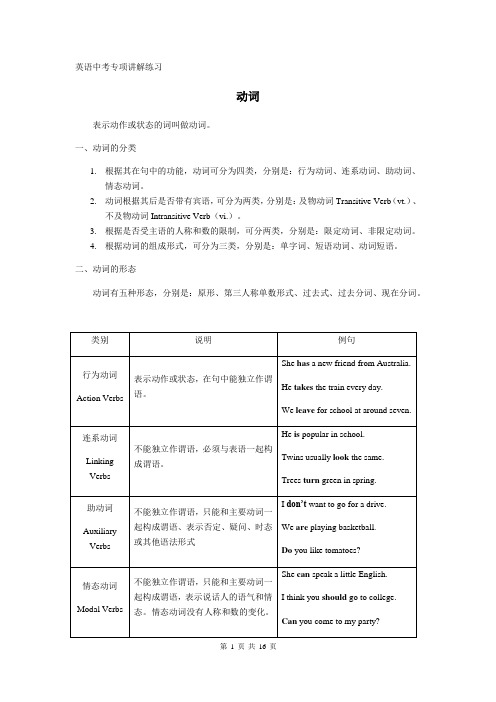
英语中考专项讲解练习动词表示动作或状态的词叫做动词。
一、动词的分类1.根据其在句中的功能,动词可分为四类,分别是:行为动词、连系动词、助动词、情态动词。
2.动词根据其后是否带有宾语,可分为两类,分别是:及物动词Transitive Verb(vt.)、不及物动词Intransitive Verb(vi.)。
3.根据是否受主语的人称和数的限制,可分两类,分别是:限定动词、非限定动词。
4.根据动词的组成形式,可分为三类,分别是:单字词、短语动词、动词短语。
二、动词的形态动词有五种形态,分别是:原形、第三人称单数形式、过去式、过去分词、现在分词。
三、行为动词行为动词又叫实义动词,实义动词意义完全,能独立作谓语。
Mr. Smith gave his wife twenty pounds for her birthday.He asked the teacher a few questions.Children and young people like bright color.He doesn’t like English. (doesn’t是助动词,无词义,like是实义动词)四、系动词系动词又叫联系动词,它本身有词义,但不能单独用作谓语,后面必须跟表语,构成系表结构说明主语的状态、性质、特征等情况。
1.状态系动词用来表示主语状态,只有be一词。
如:He is a teacher (is与补足语一起说明主语的身份)2.持续系动词用来表示主语持续或保持一种状况或态度,主要有keep, rest, remain, stay, lie, stand。
He always keeps silent at meeting.(keep系动词silent表语,系表结构作谓语)This matter rests a mystery.3.表像系动词用来表示"看起来像"这一概念,主要有seem, appear, look。
2023年中考英语语法---动词及动词短语专题复习及练习题(含答案)

2023年中考英语语法---动词及动词短语专题复习及练习题(含答案)一、动词的基本框架动词包括实义动词、系动词、助动词和情态动词。
(一)实义动词实义动词是能独立作谓语的动词。
按其句法功能可分为及物动词和不及物动词;按其持续性可分为延续性动词和非延续性动词。
1.及物动词:及物动词本身意义不完整,需要接宾语才能使其意思完整。
(1)动词+宾语I like this book very much.我非常喜欢这本书。
(2)动词+宾语+宾补We call the bird Polly.我们叫这只鸟Polly。
I saw the children play in the park yesterday.昨天我看见孩子们在公园玩。
注意:用省略to的不定式或现在分词作宾补的动词有:have,see,watch,notice,hear等。
(3)动词+间接宾语+直接宾语Please pass me the salt.请把盐递给我。
常见的带双宾语的动词有:give,bring,buy,get,leave,lend,make,offer,pass,teach,tell等。
2.不及物动词不及物动词自身意思完整,不用接宾语。
Horses run fast.马跑得快。
(1)有些动词既可作及物动词又可作不及物动词。
We study English.我们学习英语。
(及物动词)We study hard.我们努力学习。
(不及物动词)(2)有些不及物动词与一些别的词搭配在一起构成动词短语,它的作用相当于一个及物动词。
①动词+介词Listen to the teacher carefully.仔细听老师讲。
此类动词短语后面的宾语无论是名词还是代词,都只能放在介词后面,不能放在动词和介词之间。
②动词+副词+介词Let’s go on with our work!让我们继续我们的工作吧!He gets along well with his classmates.他与他的同学们相处得很好。
初中英语2025届中考动词考点分类讲解练习(实义动词+系动词+助动词+情态动词)
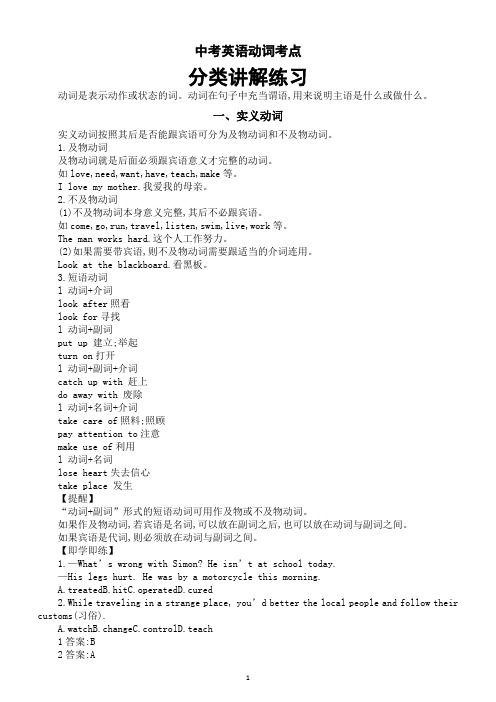
中考英语动词考点分类讲解练习动词是表示动作或状态的词。
动词在句子中充当谓语,用来说明主语是什么或做什么。
一、实义动词实义动词按照其后是否能跟宾语可分为及物动词和不及物动词。
1.及物动词及物动词就是后面必须跟宾语意义才完整的动词。
如love,need,want,have,teach,make等。
I love my mother.我爱我的母亲。
2.不及物动词(1)不及物动词本身意义完整,其后不必跟宾语。
如come,go,run,travel,listen,swim,live,work等。
The man works hard.这个人工作努力。
(2)如果需要带宾语,则不及物动词需要跟适当的介词连用。
Look at the blackboard.看黑板。
3.短语动词l 动词+介词look after照看look for寻找l 动词+副词put up 建立;举起turn on打开l 动词+副词+介词catch up with 赶上do away with 废除l 动词+名词+介词take care of照料;照顾pay attention to注意make use of利用l 动词+名词lose heart失去信心take place 发生【提醒】“动词+副词”形式的短语动词可用作及物或不及物动词。
如果作及物动词,若宾语是名词,可以放在副词之后,也可以放在动词与副词之间。
如果宾语是代词,则必须放在动词与副词之间。
【即学即练】1.—What’s wrong with Simon? He isn’t at school today.—His legs hurt. He was by a motorcycle this morning.A.treatedB.hitC.operatedD.cured2.While traveling in a strange place, you’d better the local people and follow their customs(习俗).A.watchB.changeC.controlD.teach1答案:B2答案:A二、系动词系动词不能单独作谓语,必须与表语一起构成谓语。
(完整版)初中英语语法之动词的分类讲解加练习答案
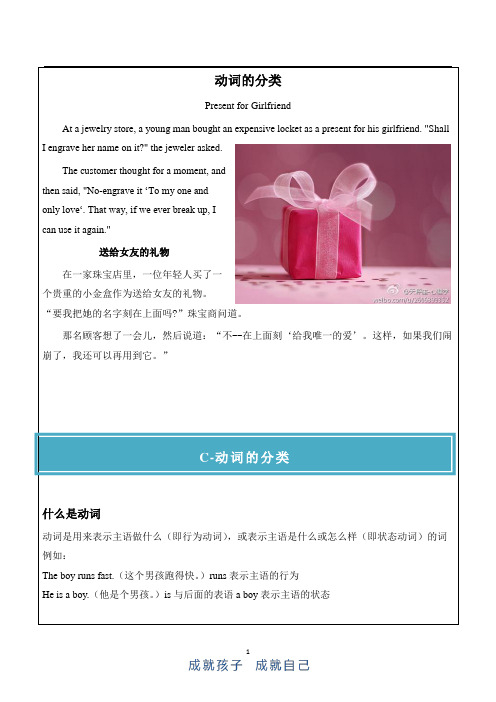
动词的分类Present for GirlfriendAt a jewelry store, a young man bought an expensive locket as a present for his girlfriend. "Shall I engrave her name on it?" the jeweler asked.The customer thought for a moment, andthen said, "No-engrave it ‘To my one andonly love‘. That way, if we ever break up, Ican use it again."送给女友的礼物在一家珠宝店里,一位年轻人买了一个贵重的小金盒作为送给女友的礼物。
“要我把她的名字刻在上面吗?”珠宝商问道。
那名顾客想了一会儿,然后说道:“不--在上面刻‘给我唯一的爱’。
这样,如果我们闹崩了,我还可以再用到它。
”C-动词的分类什么是动词动词是用来表示主语做什么(即行为动词),或表示主语是什么或怎么样(即状态动词)的词例如:The boy runs fast.(这个男孩跑得快。
)runs表示主语的行为He is a boy.(他是个男孩。
)is与后面的表语a boy表示主语的状态动词的分类一、动词可以按照含义及它们在句中的作用分成四类,即行为动词(也称实义动词)、连系动词、助动词和情态动词。
(一)、行为动词行为动词(实义动词)是表示行为、动作或状态的词。
它的词义完整,可以单独作谓语。
例如:I live in Beijing with my mother.(我和我妈妈住在北京。
)live,住It has a round face.(它有一张圆脸。
)has,有(二)、连系动词系动词亦称连系动词(Link Verb),作为系动词,它本身有词义,但不能单独用作谓语,后边必须跟表语(亦称补语),构成系表结构说明主语的状况、性质、特征等情况。
初中英语语法练习题 动词的分类和基本形式(带答案和解析)
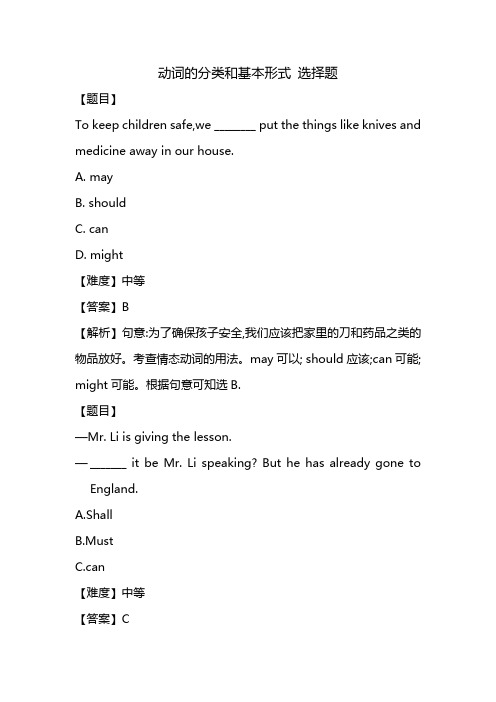
动词的分类和基本形式选择题【题目】To keep children safe,we ________ put the things like knives and medicine away in our house.A. mayB. shouldC. canD. might【难度】中等【答案】B【解析】句意:为了确保孩子安全,我们应该把家里的刀和药品之类的物品放好。
考查情态动词的用法。
may可以; should应该;can可能; might可能。
根据句意可知选B.【题目】—Mr. Li is giving the lesson.—_______ it be Mr. Li speaking? But he has already gone to England.A.ShallB.MustC.can【难度】中等【答案】C【解析】句意: —李老师正在上课。
—可能是李老师在讲课吗?可他已经去英国了。
本题考查情态动词的用法。
Shall应该;Must一定;can 可能。
由后面的“he has already gone to England”可知,前面说的是“可能是李老师在讲课吗”。
表示可能性的推测,使用情态动词can。
故正确答案为C项.【题目】—Some people don' t show their talents at the very beginning. —I agree. Even Einstein_______ read until he was seven.A. can'tB. mustC. couldn'tD. needn't【难度】中等【答案】C【解析】句意:—有些人在一开始时没表现出他们的天赋。
—我同意。
即使爱因斯坦也是到他7岁时才能阅读。
本题考查情态动词。
can't 不能; mustn't禁止; couldn't不能,can't的过去式; needn't不需要。
必备英语短语动词技巧全解及练习题(含答案)及解析
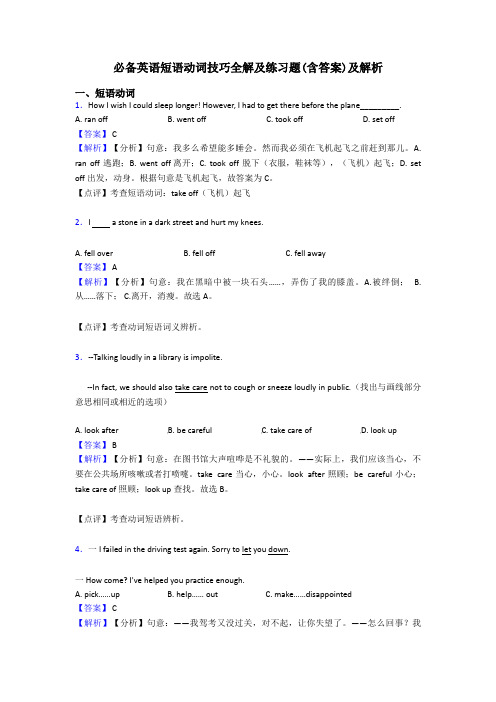
必备英语短语动词技巧全解及练习题(含答案)及解析一、短语动词1.How I wish I could sleep longer! However, I had to get there before the plane_________.A. ran offB. went offC. took offD. set off【答案】 C【解析】【分析】句意:我多么希望能多睡会。
然而我必须在飞机起飞之前赶到那儿。
A. ran off 逃跑;B. went off离开;C. took off 脱下(衣服,鞋袜等),(飞机)起飞;D. set off出发,动身。
根据句意是飞机起飞,故答案为C。
【点评】考查短语动词:take off(飞机)起飞2.I a stone in a dark street and hurt my knees.A. fell overB. fell offC. fell away【答案】 A【解析】【分析】句意:我在黑暗中被一块石头……,弄伤了我的膝盖。
A.被绊倒; B.从……落下; C.离开,消瘦。
故选A。
【点评】考查动词短语词义辨析。
3.--Talking loudly in a library is impolite.--In fact, we should also take care not to cough or sneeze loudly in public.(找出与画线部分意思相同或相近的选项)A. look afterB. be carefulC. take care ofD. look up【答案】 B【解析】【分析】句意:在图书馆大声喧哗是不礼貌的。
——实际上,我们应该当心,不要在公共场所咳嗽或者打喷嚏。
take care当心,小心。
look after照顾;be careful小心;take care of照顾;look up查找。
故选B。
【点评】考查动词短语辨析。
(英语)必备英语动词技巧全解及练习题(含答案)含解析

(英语)必备英语动词技巧全解及练习题(含答案)含解析一、动词1.The doctor warned us ___________ more fruit and vegetables instead of meat.A. to eatingB. eatC. to eatD. eating【答案】C【解析】【分析】句意:医生警告我们吃更多的水果和蔬菜而不是肉。
warn sb. to do sth.警告某人做某事,故选C。
【点评】考查动词的固定短语,根据warn的用法选出正确答案。
2.—How is our government going to deal with the office building?— It will be _____ a library.A. turned offB. turned onC. turned outD. turned into【答案】D【解析】【分析】句意:—我们的政府如何处理办公大楼?—它将变成一个图书馆。
A. turned off关掉(开关等);B. turned on打开(开关等);C. turned out结果是,证明是,D. turned into变成。
根据句意语境,可知办公楼应该是变成图书馆,故选D。
【点评】考查动词短语辨析题。
熟记四个短语的不同意义。
3.—Have some ice cream, please. —Mm, it tastes_______.A. goodB. betterC. well【答案】A【解析】【分析】句意:一请来些冰激凌吧。
嗯,尝起来很好。
结合句意可知没有比较,故排除B。
感官动词,看做系动词,后加形容词。
尝起来,good形容词,好的,well副词,好地。
故选A。
4.This kind of cloth _ soft.A. feelsB. tastesC. smells【答案】A【解析】【分析】句意:这种布摸起来是柔软的。
A.感觉,触摸;B.尝起来;C.闻起来。
【英语】初中英语动词基本形式解题技巧讲解及练习题(含答案)

【英语】初中英语动词基本形式解题技巧讲解及练习题(含答案)一、动词基本形式1.—Do you often see Tony ________ football in the park?—Yes. Look!Now we can see him _______ football over there.A. play;playB. playing;playC. play;playingD. plays; play【答案】 C【解析】【分析】句意:---你经常看见托尼在公园踢足球吗?---是的,看,现在我们看见他在那边踢足球。
see sb do sth看见某人做过某事(强调动作的全过程),所以第一空用动词原形play;see sb doing sth看见某人正在做某事(强调动作正在进行),所以第二空用动词的现在分词playing。
故答案为C。
【点评】考查see跟宾语补足语的用法,掌握see sb do与see sb doing的基本区别,根据语境进行判断。
2.These pictures show the of life. Who them?A. beauty; paintedB. beauty; were paintedC. beautiful; paintedD. beautiful; were painted【答案】 A【解析】【分析】句意:这些图画展示了生命的美丽。
谁画的?根据句意可知第一空应填名词beauty美丽。
第二空主语为 who(指人),应该用主动语态。
故选A。
【点评】考查过去式和过去分词。
3.The girl has a boyfriend Bill.A. callB. calledC. is calledD. is calling【答案】 B【解析】【分析】句意:那个女孩有个名叫比尔的男朋友。
此题考查过去分词做定语。
called名叫......的。
故选B。
【点评】考查动词的不同形式。
(英语)英语短语动词解题技巧及练习题(含答案)

(英语)英语短语动词解题技巧及练习题(含答案)一、短语动词1.—The children in rural areas have few books to read. Let's ______ some books to them.—Great, it is a good idea.A. give awayB. hand outC. take outD. put out【答案】 A【解析】【分析】句意:--在农村地区的孩子们有很少的书去阅读。
让我们捐赠一些书给他们吧。
分析选项:give away捐赠;hand out分发;take out拿出来;put out扑灭。
结合句意表示捐赠之意,因此选择第一项。
故选 A【点评】考查词组的用法。
2.I a stone in a dark street and hurt my knees.A. fell overB. fell offC. fell away【答案】 A【解析】【分析】句意:我在黑暗中被一块石头……,弄伤了我的膝盖。
A.被绊倒; B.从……落下; C.离开,消瘦。
故选A。
【点评】考查动词短语词义辨析。
3.--- Who is Dave looking ______?--- His mother. She's been in hospital for a few days.A. forB. afterC. atD. up【答案】 B【解析】【分析】句意:——Dave在照顾谁?——他妈妈,她住院好几天了。
look after照顾;look for寻找;look at看;look up查找。
根据in hospital可知选B。
【点评】考查介词辨析,牢记look的固定搭配。
4.Joe has caused many problems and his dad can't ______ good ways to solve his trouble.A. come up withB. catch up withC. work outD. write down【答案】 A【解析】【分析】come up with”想出“;catch up with”赶上“;work out”解决“;write down”写下来“。
【英语】非谓语动词讲解及练习(含答案)

【英语】非谓语动词解说及练习(含答案)一、单项选择非谓语动词1.The film star wears sunglasses. Therefore, he can go shopping without ___________. A.recognizing B.being recognizedC. having recognized D. having been recognized【答案】 B【分析】试题剖析:本题考察动词的非谓语动词形式。
句意:那位电影明星戴上墨镜。
所以,他去买东西不会被认出来。
依据题中的介词without判断,今后应当使用动词的动名词形式,因为他是被人认出的,所以应当用动名词的被动式,所以选B。
考点:考察非谓语动词的用法2.(天津 ) The hospital has recently obtained new medical equipment, ________ more patients to be treated.A. being allowed B.allowingC. having allowed D. allowed【答案】 B【分析】【详解】考察非谓语动词。
句意:近期这个医院购进了新的医疗设施,同意更多的病人被治疗。
前句购进医疗设施和后边同意更多的病人被治疗之间是必定的结果关系,用doing 即此刻分词作结果状语,表示理所应当的结果。
A. being allowed 表示被动且正在进行; C. having allowed 重申先于谓语动词发生; D. allowed 表示被动且达成,应选B。
【点睛】判断非谓语动词的形式的第一步是剖析句子成分,看是用谓语动词仍是非谓语动词,确立了是非谓语动词,还要判断非谓语动词的成分,和这个动词和逻辑主语的关系。
3.________ by the advances in technology, many farmers have set up wind farms on their land. A. Being encouraged B.EncouragingC. Encouraged D. Having encouraged【答案】 C【分析】试题剖析:考察过去分词做状语:句意:被科技的进步激励着,好多农民在自己的土地上建起了风力发电厂。
英语动词分类讲解及练习(有答案)
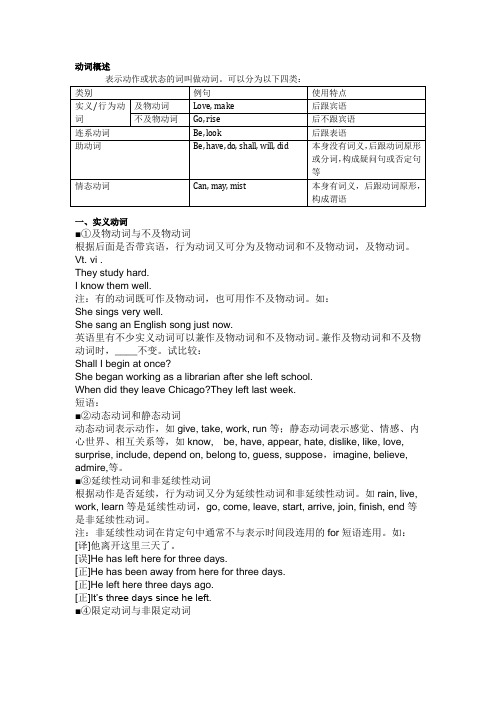
动词概述一、实义动词■①及物动词与不及物动词根据后面是否带宾语,行为动词又可分为及物动词和不及物动词,及物动词。
Vt. vi .They study hard.I know them well.注:有的动词既可作及物动词,也可用作不及物动词。
如:She sings very well.She sang an English song just now.英语里有不少实义动词可以兼作及物动词和不及物动词。
兼作及物动词和不及物动词时,____不变。
试比较:Shall I begin at once?She began working as a librarian after she left school.When did they leave Chicago?They left last week.短语:■②动态动词和静态动词动态动词表示动作,如give, take, work, run等;静态动词表示感觉、情感、内心世界、相互关系等,如know, be, have, appear, hate, dislike, like, love, surprise, include, depend on, belong to, guess, suppose,imagine, believe, admire,等。
■③延续性动词和非延续性动词根据动作是否延续,行为动词又分为延续性动词和非延续性动词。
如rain, live, work, learn等是延续性动词,go, come, leave, start, arrive, join, finish, end等是非延续性动词。
注:非延续性动词在肯定句中通常不与表示时间段连用的for短语连用。
如:[译]他离开这里三天了。
[误]He has left here for three days.[正]He has been away from here for three days.[正]He left here three days ago.[正]It’s three days since he left.■④限定动词与非限定动词限定动词在句中作谓语,有人称和数的变化。
(英语)必备英语非谓语动词技巧全解及练习题(含答案)及解析

(英语)必备英语非谓语动词技巧全解及练习题(含答案)及解析一、非谓语动词1.________, he has to listen to tapes every day.A. To learn English wellB. Learn English wellC. Learning English well【答案】 A【解析】【分析】句意:为了学好英语,他不得不每天听录音。
选项部分在句子中表示目的,故用动词不定式,故选A。
【点评】此题考查动词不定式。
注意动词不定式的成分。
2.The workers were made from morning to night in the past.A. workedB. to workC. workD. working【答案】 B【解析】【分析】句意:在过去工人们被迫从早晨工作到晚上make sb do sth让某人做某事,其被动语态形式sb be made to do sth所以选B。
3.To keep children away from danger,we warn parents ________ children at home alone.A. leaveB. to leaveC. not leaveD. not to leave【答案】 D【解析】【分析】考查不定式短语.句意:为了让孩子们远离危险,我们警告家长不要把孩子单独留在家里.warn sb not to do sth警告某人不要做某事.根据题干To keep children away from danger为了让孩子们远离危险,可知应说我们警告家长不要把孩子单独留在家里.故选D.4.—In my opinion, animals shouldn't be kept for fun.— I think so. Forests are the best places for animals ______________.A. liveB. livingC. to liveD. to live in【答案】 D【解析】【分析】句意:——在我看来,动物不应该被用来取乐。
中考英语总复习动词的分类用法(基础知识)习题及答案
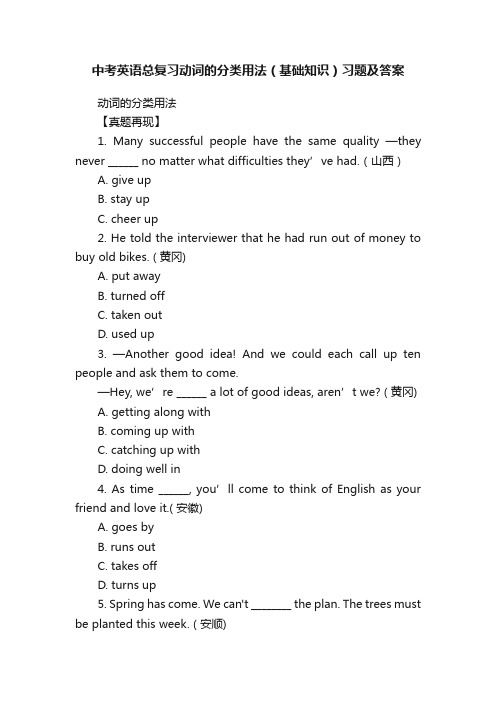
中考英语总复习动词的分类用法(基础知识)习题及答案动词的分类用法【真题再现】1. Many successful people have the same quality —they never ______ no matter what difficulties they’ve had.(山西)A. give upB. stay upC. cheer up2. He told the interviewer that he had run out of money to buy old bikes. ( 黄冈)A. put awayB. turned offC. taken outD. used up3. —Another good idea! And we could each call up ten people and ask them to come.—Hey, we’re ______ a lot of good ideas, aren’t we? ( 黄冈)A. getting along withB. coming up withC. catching up withD. doing well in4. As time ______, you’ll come to think of English as your friend and love it.( 安徽)A. goes byB. runs outC. takes offD. turns up5. Spring has come. We can't ________ the plan. The trees must be planted this week. ( 安顺)A. put offB. make upC. come up withD. look up6. It ________ about eight minutes for sunlight (阳光) to travel from the sun to the earth. ( 临沂)A. takesB. spendsC. costsD. pays7. —Don't ______ late, Mary. You have a singing competition tomorrow morning.—Ok, dad, I'll go to bed right now. ( 温州)A. dress upB. grow upC. stay upD. mix up8. — Mum, shall we go to the beach tomorrow? ( 广东)— It ______ the weather.A.carries on B.lives on C.depends on D.holds on9. Our government has tried many ways to ________ the smog(雾霾) problem.Maybe we’ll havea clear sky in the near future. ( 哈尔滨)A.put away B.work out C. come up10. Life is a journey with trouble, but with care and wisdom you can ________ any problem you face. ( 常州)A. work outB. hand outC. find outD. put out11. Lao She’s Teahouse ______ the changes in Chinese society over fifty years.( 天津)A. describesB. improvesC. preparesD. corrects12. Fresh food is good for you. But you have to _______ it first because sometimes it is a little dirty. ( 江西)A. tasteB. smellC. washD. plant【答案与解析】1. A。
中考英语动词和动词短语专题复习及练习题(含答案)

中考英语动词和动词短语专题复习及练习题(含答案)复习目标:一.动词分类二.动词辨析(感官动词辨析和实义动词辨析)三.动词短语考点讲解一.命题点1:动词分类(必考:每年2~5道;单选、完形,词语运用) 概念:动词是表示人或事物动作或状态的词。
1.实义动词(必考) 及物动词和不及物动词。
(辨析类试题为主)2.系动词:be,感官动间(taste,smell,feel,sound,look)(2016.34,2014.35)等3.助动词:do,does,did,have,has等4.情态动词:can,may,must,need等(详见下一专题)巩固练习词汇运用1.Don't be afraid of___(fail),because it makes us grow.2. The Jiaozi Road is closed today because workers are ___(make)some repairs.3.I must return the camera to Li Lei.I have ____ (keep)it for two weeks.4.Can you ____(see)the new build? It was buil last year.二.命题点2:动词辨析(感官动词辨析和实义动词辨析)考向一:感官动词辨析河北中考近6年考查了2次感官动词辨析,均在单项选择中考查smell的用法。
初中常见的感官动词还有sound(s),feel(s),taste(s),look(s)。
解答此类试题的关键是剖析题干中的搭配词及语境.巩固练习单项选择1 .(2016 河北34 题)The air___fresh after the rain. And the sky is blue.A. feelsB. tastesC. smellsD. sounds2. (2014 河北35 题) Mom is making dinner. It___so nice!A. smellsB. tastesC. feelsD. sounds3. The cake ____delicious. I’d like to have another one.A. tastesB. looksC. soundsD. feels4.TFBOYS's songs ____sweet and many of us like lislening to them.A. soundB. feelC. tasteD. look5. This dress is made of silk.It ____comfortable.A. looksB. smellsC. feelsD. sounds考向二:实义动词辨析1.实义动词辨析(6年15考)解答实义动词词义辨析类试题时,首先要分析各个选项的词义,然后分析语境,找出关键词,或者根据前后文语境的逻辑关系来确定正确答案。
初中英语语法之动词的分类 讲解加练习 答案
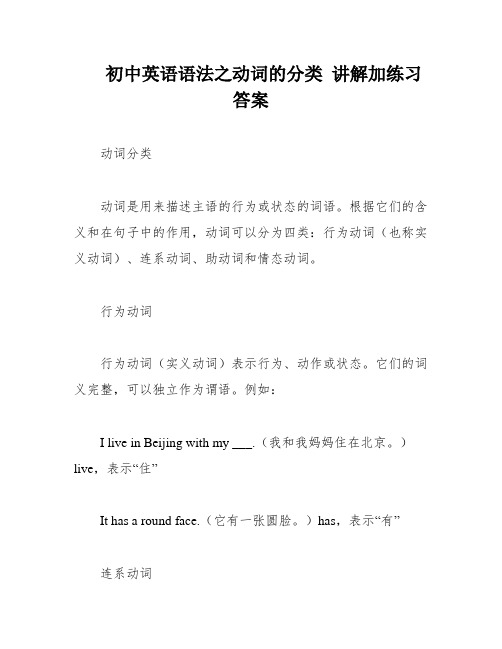
初中英语语法之动词的分类讲解加练习答案动词分类动词是用来描述主语的行为或状态的词语。
根据它们的含义和在句子中的作用,动词可以分为四类:行为动词(也称实义动词)、连系动词、助动词和情态动词。
行为动词行为动词(实义动词)表示行为、动作或状态。
它们的词义完整,可以独立作为谓语。
例如:I live in Beijing with my ___.(我和我妈妈住在北京。
)live,表示“住”It has a round face.(它有一张圆脸。
)has,表示“有”连系动词连系动词(也称系动词)本身有词义,但不能单独用作谓语,必须与表语(也称补语)一起构成系表结构,说明主语的状态、性质、特征等情况。
连系动词后不可接副词,只能接形容词。
大致分为七种:1)状态系动词:用来表示主语的状态,只有be一词,例如:He is a ___.(他是一名教师。
)is与表语一起说明主语的身份。
I am fine.2)持续系动词:表示主语的持续状态,例如:She is ___.(她正在睡觉。
)___ ___.(婴儿在哭泣。
)3)感官系动词:表示主语的感官状态,例如:The soup ___.(汤闻起来很香。
)___ ___.(花看起来很美。
)4)变化系动词:表示主语的变化状态,例如:___.(天气正在变化。
)___ ___.(树叶正在变黄。
)5)成为系动词:表示主语的转变状态,例如:___.(她成为了一名医生。
)___ ___.(毛毛虫变成了蝴蝶。
)6)保持系动词:表示主语的保持状态,例如:___ calm.(他保持冷静。
)___.(情况保持不变。
)7)证明系动词:表示主语的证明状态,例如:___ his innocence.(证据证明他无罪。
)___.(这个理论仍未被证明。
)助动词和情态动词助动词和情态动词都是用来帮助其他动词的,不具备独立的词义。
助动词用来构成时态和语态,情态动词则用来表示可能性、建议、义务等情态。
例如:He is running.(他正在跑步。
(英语)英语动词答题技巧及练习题(含答案)及解析

(英语)英语动词答题技巧及练习题(含答案)及解析一、动词1.Not only you but also he ____good at _____.A. is, singingB. are, singingC. is, to singD. are, to sing【答案】 A【解析】【分析】not only…but also连接两个并列主语,谓语动词就近一致。
be good at doing sth.故选A。
【点评】考查not only…but also的就近一致。
熟练掌握短语,答案很容易得出。
2.Mom, what are you cooking now? It so nice.A. smellsB. feelsC. soundsD. tastes【答案】 A【解析】【分析】句意:妈妈,你在煮什么?闻起来这样香。
A.闻起来;B.感觉起来,摸起来;C.听起来;D.尝起来。
从语境上可以分析出,我没有看到妈妈煮的什么,只是闻到了香味,用闻起来,故选A。
3.— There are dark clouds, and the wind is blowing strongly.— It ______ that a typhoon is coming.A. feelsB. soundsC. seemsD. looks【答案】C【解析】【分析】考查连系动词辨析。
句意:“—有乌云,风很大。
”“—好像台风要来了。
” 能接as if/as though表语从句的系动词有:look(看起来),smell(闻起来),sound(听起来),feel(觉得);appear(显得),seem(似乎)。
可用于“It+系动词+that从句”结构的有:seem, appear, 不可用be, look。
根据语境,故选C。
4.—What do you think of the dish I cooked for you? —I haven't had it yet. However, it good.A. tastesB. smellsC. soundsD. feels【答案】B【解析】【分析】句意:—你认为我给你做的菜怎么样?—我还没有吃。
- 1、下载文档前请自行甄别文档内容的完整性,平台不提供额外的编辑、内容补充、找答案等附加服务。
- 2、"仅部分预览"的文档,不可在线预览部分如存在完整性等问题,可反馈申请退款(可完整预览的文档不适用该条件!)。
- 3、如文档侵犯您的权益,请联系客服反馈,我们会尽快为您处理(人工客服工作时间:9:00-18:30)。
一.动词概述注:英语行为动词也可以分为及物动词和不及物动词。
及物动词是必须带宾语的动词。
可以分为两类:(1)及物动词+宾语(2)及物动词+间接宾语+直接宾语My mother bought me a gift. (可以接双宾语的词有:give, teach, buy, l end, find, hand, leave, sell, show, read, pay, make, offer, build, pass, bring, cook等不及物动词不需要跟宾语,本身意义完整。
有些不及物动词加上介词后变成及物性短语动词,后跟宾语。
She did not reply to my letter。
英语中接双宾语的动词award sb. sth. = award sth. to sb. 颁奖给某人bring sb. sth. = bring sth. to sb. 把某物带给某人hand sb. sth. =hand sth. to sb. 把某物递给某人lend sb. sth. = lend sth. to sb. 把某物借给某人mail sb. sth. = mail sth. to sb. 把某物寄给某人offer sb. sth. = offer sth. to sb. 将某物给某人owe sb. sth. = owe sth. to sb. 欠某人某物pass sb. sth. = pass sth. to sb. 把某物递给某人pay sb. sth. = pay sth. to sb. 付给某人某物(钱)post sb. sth. = post sth. to sb. 把某物寄给某人read sb. sth. = read sth. to sb. 把某物读给某人听return sb.sth. = return sth. to sb. 把某物还给某人send sb. sth. = send sth. to sb. 把某物送给某人sell sb. sth. = sell sth. to sb. 把某物卖给某人serve sb. sth. = serve sth. to sb. 拿某物招待某人show sb. sth. = show sth. to sb. 拿某物给某人看take sb. sth. = take sth. to sb. 把某物拿给某人teach sb. sth. = teach sth. to sb. 教某人某物tell sb. sth. = tell sth. to sb. 告诉某人某情况throw sb. sth. = throw sth. to sb. 把某物扔给某人write sb. sth. = write sth. to sb. 给某人写信2、双宾语易位时需借助介词for的常用动词book sb. sth. = book sth. for sb. 为某人预定某物buy sb. sth. = buy sth. for sb. 为某人买某物choose sb. sth. = choose sth. for sb. 为某人选某物cook sb. sth. = cook sth. for sb. 为某人煮某物draw sb. sth. = draw sth. for sb. 为某人画某物fetch sb. sth. = fetch sth. for sb. 为某人去取某物find sb. sth. = find sth. for sb. 为某人找到某物fix sb. sth. = fix sth. for sb. 为某人准备某物get sb. sth. = get sth. for sb. 为某人拿来某物make sb. sth. = make sth. for sb. 为某人做某物order sb. sth. = order sth. for sb. 为某人订购某物pick sb. sth. = pick sth. for sb. 为某人采摘某物prepare sb. sth. = prepare sth. for sb. 为某人准备某物save sb. sth. = save sth. for sb. 为某人留某物sing sb. sth. = sing sth. for sb. 为某人唱某物(歌)spare sb. sth. = spare sth. for sb. 为某人让出某物steal sb. sth. = steal sth. for sb. 为某人偷某物3、有的动词后接的双宾语易位时,既可用介词to引出间接宾语,也可用介词for引出间接宾语,含义相同。
如bring,play等:Bring me today’s paper.= Bring today’s paper to [for] me. 把今天的报纸拿给我。
He played us the record he had just bought.= He played the record he had just bought for [to] us.他放了他刚买的唱片给我们听。
4、有的动词后接的双宾语易位时,即可用介词to引出间接宾语,也可用介词for引出间接宾语,含义不同。
如leave等:They left me no food.= They left no food for me.他们没给我留一点食物。
My uncle left me a large fortune.= My uncle left a large fortune to me. 叔叔死后留下一大笔财产给我。
5、而有的动词后接双宾语时,既不能用介词to引出间接宾语,也不能用介词for引出间接宾语。
如allow, ask, cause, charge, cost, forgive, refuse等:He allows his son too much money. 他给他儿子的钱太多。
He asked me some questions. 他问了我一些问题。
This caused me much trouble. 这给我带来了许多麻烦。
He charged me five dollars for a cup of tea. 他一杯茶向我要了5美元。
His mistake cost him his job. 他的错误让他丢了工作。
I envy you your good luck. 我羡慕你的好运。
They forgave him his rudeness. 他们原谅了他的鲁莽。
He refused her nothing. 她要什么他就给什么。
二.常用动词用法(见后)三.连系动词系动词亦称连系动词(Link Verb),作为系动词,它本身有词义,但不能单独用作谓语,后边必须跟表语(亦称补语),构成系表结构说明主语的状况、性质、特征等情况。
系动词后不可接副词,接的是形容词。
大致分七种1)状态系动词用来表示主语状态,只有be一词,例如:He is a teacher. 他是一名教师。
(is与补足语一起说明主语的身份。
)I am fine.2)持续系动词用来表示主语继续或保持一种状况或态度,主要有keep, rest, remain, stay, lie, stand, 例如:He always kept silent at meeting. 他开会时总保持沉默。
This matter rests a mystery. 此事仍是一个谜。
3)表像系动词用来表示"看起来像"这一概念,主要有seem, appear, look, 例如:He looks tired. 他看起来很累。
He seems (to be) very sad. 他看起来很伤心。
4)感官系动词感官系动词主要有feel, smell, sound, taste, 例如:This kind of cloth feels very soft.这种布手感很软。
This flower smells very sweet.这朵花闻起来很香。
5)变化系动词这些系动词表示主语变成什么样,变化系动词主要有become, grow, turn, fall(asleep), get, go, come, run.例如:He became mad after that. 自那之后,他疯了。
She grew rich within a short time. 她没多长时间就富了。
6)终止系动词表示主语已终止动作,主要有prove, turn out, 表达"证实","变成"之意,例如:The rumor proved false. 这谣言证实有假。
The search proved difficult. 搜查证实很难。
His plan turned out a success. 他的计划终于成功了。
(turn out表终止性结果)7.使役动词:let,have,make 使,让…Let /make somebody do sthThe teacher lets/makes them clean the classroom after school.Make sb/sth adj.The story makes me happy. The color makes it look beautiful.Have somebody do sth 让某人做某事Have sth done 让某物被My mother haves me make the bed. I have my hair cut/washed.有些动词它们既可以用作实义动词,又可以用作连系动词。
另外be还可用作助动词。
它们的用法不同,词义和句型结构也有所不同。
例如:Look at the blackboard, please.请看黑板。
(look用作实义动词)He looks a little tired.他略显疲倦。
(look用作连系动词)They are at work.他们在工作。
(are用作连系动词)They are working.他们正在工作。
(are用作助动词,帮助构成现在进行时)四.助动词1、助动词be(am, is, are, was, were, being, been)的用法(1)be后跟现在分词构成进行时态。
Who is playing the violin?谁在拉小提琴?She was reading a book then.那时她正在读书。
(2)be后跟过去分词构成被动语态。
He was asked to d o the work.有人要他干这件工作。
